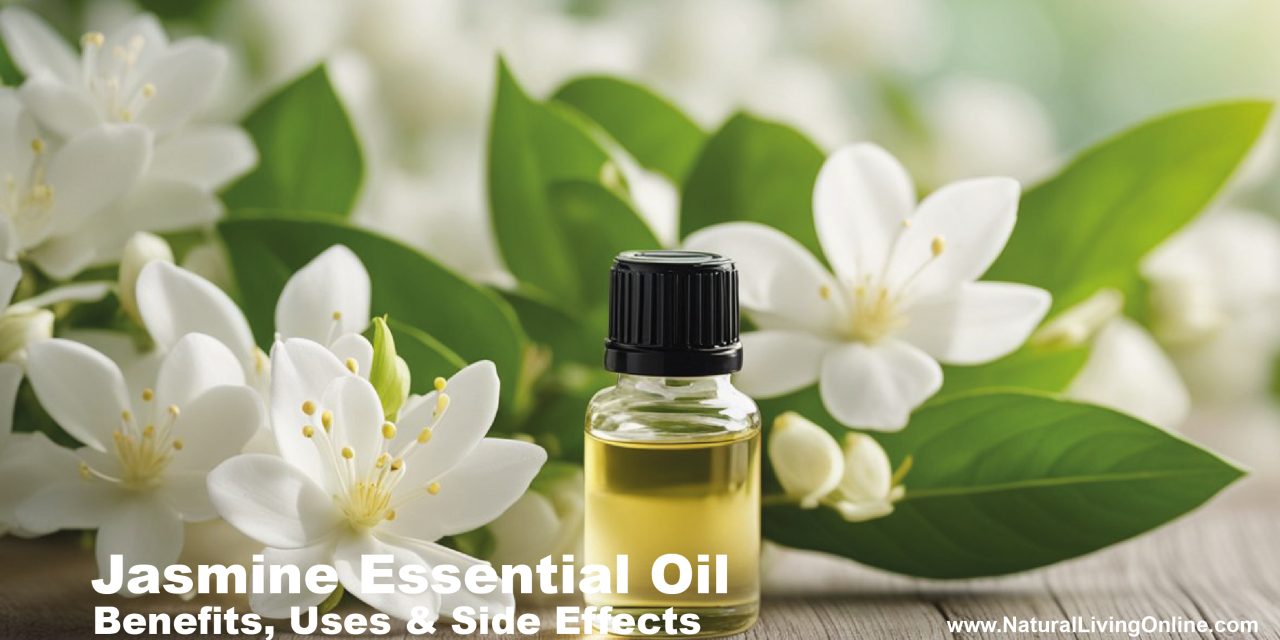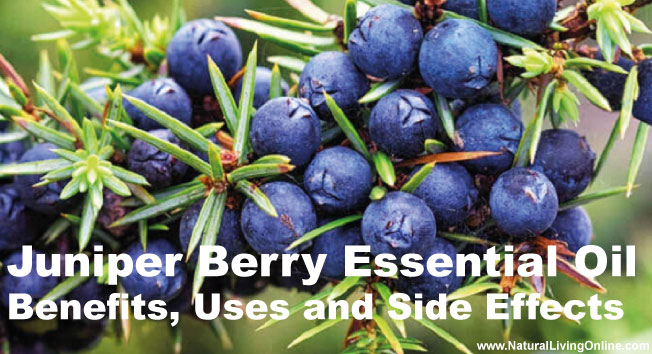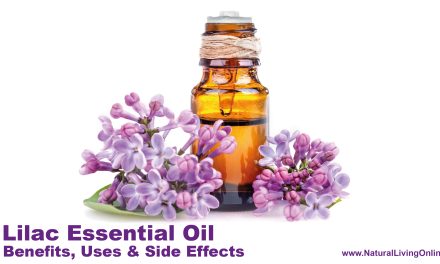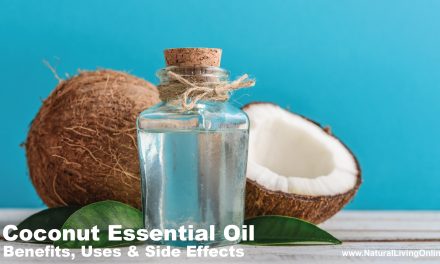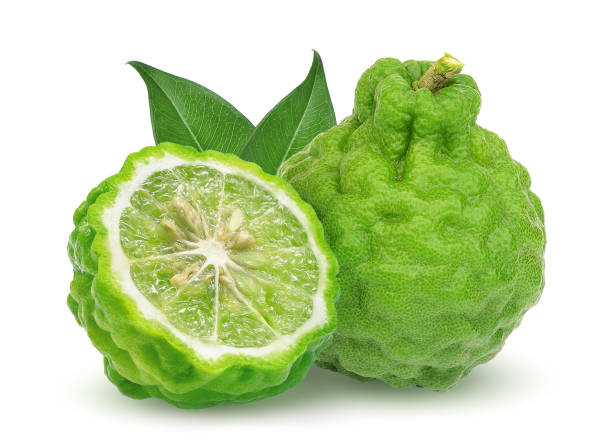Jasmine essential oil, often celebrated for its alluring fragrance, is more than just a pleasant aroma. Extracted from the flowers of the jasmine plant, this oil is believed to offer a number of therapeutic benefits ranging from mood improvement to providing relief in spasmodic conditions. It’s also leveraged in various applications, from perfumery to aromatherapy, and even in skincare. Its delicate scent is not only a staple in the perfume industry but is also a common fixture in homes seeking a calming and soothing atmosphere.
Despite its wide array of uses, it’s important for consumers to be aware of the potential side effects associated with jasmine essential oil. While generally considered safe for most people, there are cautions to bear in mind especially concerning allergies or skin sensitivity. Applying the essential oil topically may require dilution with a carrier oil to minimize risks. Moreover, using jasmine essential oil responsibly is crucial to ensure safety.
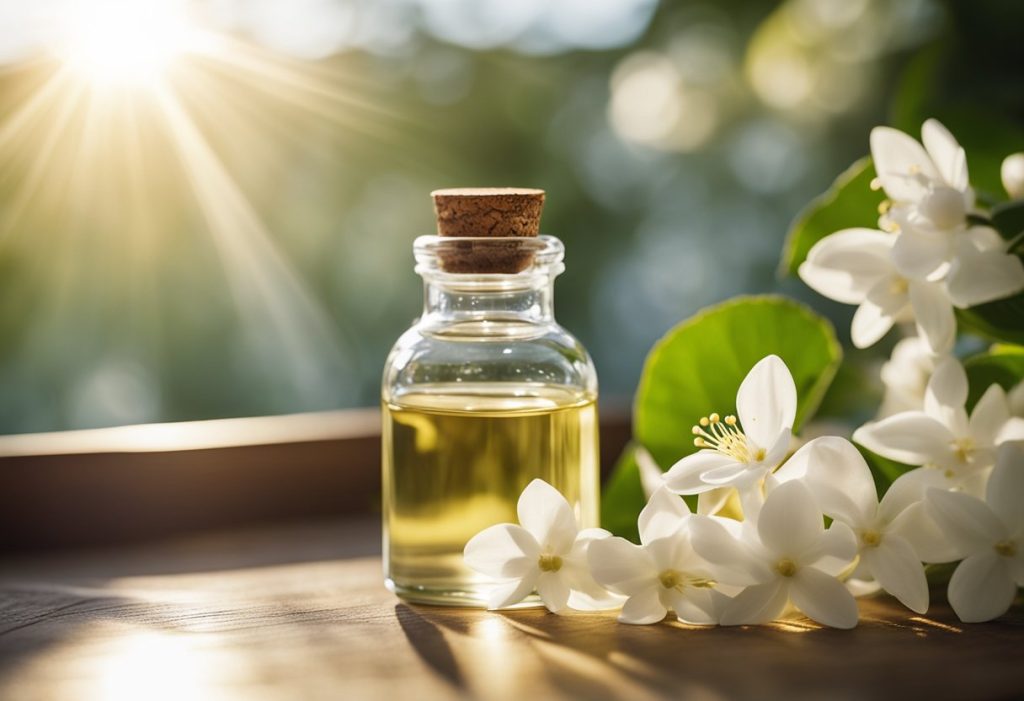
Key Takeaways
- Jasmine essential oil may offer mood enhancement and spasm relief.
- It’s used in diverse applications such as skincare and aromatherapy.
- Awareness of potential side effects and proper usage is crucial for safety.
The Essence of Jasmine Oil
Jasmine essential oil is a highly valued product extracted from the flowers of the jasmine plant. It possesses a sweet aroma and is known for its various applications in aromatherapy, perfumery, and as a remedy for certain health conditions.
Botanical Profile
Jasmine refers to the fragrant flowers of the Jasminum species, notably Jasminum officinale and Jasminum grandiflorum. These plants are admired for their delicate white blossoms that release their signature scent at night. Jasminum officinale, commonly known as common jasmine, is widely used for its essential oils, while Jasminum grandiflorum, also known as Spanish jasmine, is praised for its slightly stronger fragrance and therapeutic properties.
Extraction Process
The extraction of jasmine essential oil is predominantly done through steam distillation, a method that preserves the intricate constituents of the oil. During this intricate process, steam passes through the jasmine blossoms, releasing the volatile compounds. These compounds then condense back into liquid form upon cooling. This method helps in obtaining a pure essence that retains the characteristic scent and therapeutic benefits of the jasmine plant. Essential oils obtained in this manner are widely sought after due to their concentrated aroma and potency.
Essential Oil Profile

Botanical Name: Jasminum spp. (Several species are used for essential oil production, including Jasminum grandiflorum and Jasminum officinale.)
Common Names: Jasmine, Jessamine
Plant Family: Oleaceae (Olive family)
Countries of Origin: Jasmine is native to tropical and subtropical regions of Asia, particularly India, China, and Southeast Asia. It is also cultivated in countries like Egypt, Morocco, and France.
Extraction Method: Jasmine essential oil is typically extracted through solvent extraction or enfleurage of the flowers. Steam distillation is less common due to the delicate nature of jasmine flowers.
Parts Used: Flowers
Essential Oil Smell: Jasmine essential oil has a rich, exotic, and intensely floral aroma with sweet, warm, and slightly fruity undertones. It is often described as sensual, romantic, and intoxicating.
Essential Oil Color: Pale yellow to golden yellow.
Viscosity: Medium to Thick
Perfumery Note: Base Note
Strength of Aroma: Strong
Blends Well With
- Floral oils such as rose and ylang-ylang
- Citrus oils like bergamot and neroli
- Woody oils such as sandalwood and cedarwood
- Spicy oils like ginger and cardamom
Therapeutic Properties
- Aphrodisiac
- Relaxant
- Antidepressant
- Antiseptic
- Antispasmodic
Uses
- Perfumery: Jasmine oil is highly valued in perfumery for its exquisite fragrance and is often used as a base note in luxury perfumes, colognes, and fragrances.
- Aromatherapy: Jasmine oil is used in aromatherapy to promote relaxation, uplift mood, and enhance feelings of sensuality and romance. It is often diffused or used in massage blends.
- Skincare: Due to its skin-nourishing and rejuvenating properties, jasmine oil is used in skincare products to help improve skin elasticity, reduce the appearance of scars and stretch marks, and promote a radiant complexion.
- Haircare: Jasmine oil is added to haircare products for its ability to moisturize the scalp, strengthen hair follicles, and impart a natural shine to the hair.
Contraindications
- Jasmine oil is generally safe for most people when used in moderation. However, it may cause skin irritation or allergic reactions in individuals with sensitive skin. Perform a patch test before using it topically.
- Pregnant women should avoid using jasmine oil, especially during the first trimester, as it may stimulate uterine contractions.
Side Effects
- In rare cases, jasmine oil may cause headaches or nausea in individuals who are sensitive to strong floral scents. Discontinue use if any adverse reactions occur.
- Avoid ingesting jasmine oil as it can be toxic and may cause gastrointestinal upset.
Types
- There are several species of jasmine plants that produce essential oils with similar aromatic profiles, including Jasminum grandiflorum (also known as Royal Jasmine or Spanish Jasmine) and Jasminum officinale (Common Jasmine or Poet’s Jasmine).
Chemical Constituents with Percentages
- The chemical composition of jasmine essential oil can vary depending on factors such as the species of jasmine and the extraction method used. Some of its main constituents include:
- Benzyl acetate (20-40%)
- Benzyl alcohol (10-25%)
- Indole (5-20%)
- Methyl anthranilate (1-10%)
- Eugenol (1-5%)
The percentages may vary depending on the quality of the oil and the specific jasmine species used.
Therapeutic Benefits and Uses

Jasmine oil is renowned for its wide array of therapeutic benefits, ranging from mood enhancement and skin care to relaxation and respiratory support. Each application capitalizes on the oil’s potent properties to deliver health benefits.
Aromatherapy and Mood Enhancement
In aromatherapy, jasmine essential oil is often used for its uplifting and emotionally balancing effects. Its floral scent is known to enhance mood and alleviate feelings of stress and depression. When inhaled, compounds in jasmine oil can trigger the release of serotonin, creating an instant sense of wellbeing and calm.
- Mood enhancement: Effective in soothing nerves and boosting spirits.
- Aphrodisiac: Historically utilized for its sensual and mood-lifting properties.
Skin Care and Healing
Jasmine oil’s antimicrobial and anti-inflammatory properties make it an excellent addition to skin care routines, especially for those with sensitive skin or conditions like eczema. It aids in healing minor skin infections and may reduce the appearance of scars.
- Eczema relief: Helps soothe skin irritation and dryness.
- Scar reduction: May improve skin elasticity and support the healing process.
Relaxation and Sleep
As a natural sedative, jasmine essential oil has a calming effect on the body and mind, which is often utilized to promote relaxation and better sleep. Incorporating jasmine oil into massage oil blends or bedtime routines can help reduce headaches and induce a state of tranquility.
- Calming: Conducive to rest and relaxation, preparing the body for sleep.
- Sleep aid: Utilized as a complement to treatments for sleep-related issues.
Respiratory and Immune Support
The antioxidant properties of jasmine oil provide support for the immune system, while its calming effects can be beneficial for relieving respiratory conditions. Using jasmine oil in steam inhalation or in a diffuser can help reduce pain associated with respiratory congestion.
- Immune booster: Strengthens the body’s natural defenses.
- Respiratory aid: Can alleviate symptoms of coughs and colds.
The therapeutic applications of jasmine essential oil are diverse. It is a resource for those seeking natural remedies for emotional balance, skin health, relaxation, and respiratory well-being.
Integrating Jasmine Essential Oil into Daily Life
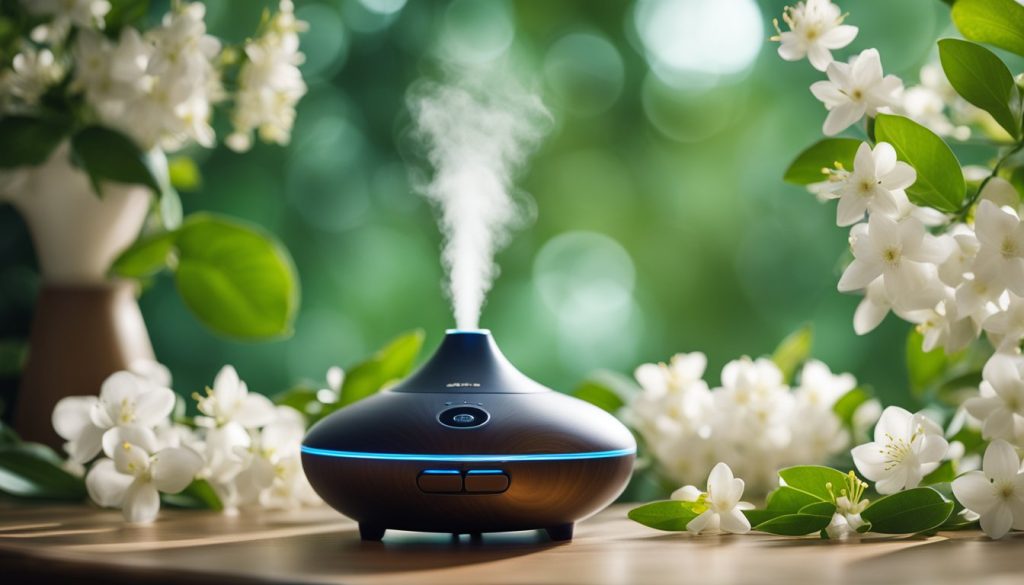
Jasmine essential oil offers a multitude of benefits, from enhancing mood to skincare applications. By understanding the appropriate methods of use and potential oil blends, individuals can seamlessly incorporate jasmine oil into their daily self-care routine.
Methods of Use
Inhalation: For mental clarity and stress relief, jasmine essential oil can be inhaled directly or used in a diffuser. Add a few drops to the diffuser with water and inhale deeply to experience the aromatic benefits. Alternatively, a few drops on a cotton ball for direct inhalation can provide similar effects.
Topical Application: When diluted with a carrier oil like coconut or jojoba oil, jasmine essential oil can be applied directly to the skin. It is found in various cosmetics and can be mixed into lotions or creams. Ensure to conduct a patch test before widespread use to prevent skin sensitivities.
Blending with Other Oils
Jasmine essential oil blends well with a variety of other essential oils for both aromatic and therapeutic uses. Here are some specific blends:
- Relaxation: Combine with lavender oil for a calming perfume or add to a nighttime bath mixture.
- Mood Enhancer: Blend with orange or bergamot for a citrusy, uplifting scent.
- Sensual Aroma: Mix with rose and sandalwood to create a warm, romantic fragrance suitable for homemade perfumes.
When blending with other oils, it’s essential to balance the scents and properties according to personal preferences and desired outcomes. Dilution with an appropriate carrier oil is crucial for safe topical application.
Safety and Precautions
When considering the use of jasmine essential oil, it’s crucial to be aware of potential side effects and allergic reactions. This section will address the adverse effects one might experience and the precautions necessary to minimize risks.
Understanding Side Effects
Jasmine essential oil is generally recognized for its range of benefits, but like all essential oils, it can also cause side effects. Irritation and redness are common symptoms if the oil is applied in high concentration or without proper dilution. Users may also experience dermatitis, which is a form of skin inflammation. It is particularly important for those who are pregnant or lactating to consult a healthcare provider before use, as the effects on childbirth and lactation are not well-documented.
Delving into Allergic Reactions
Allergic reactions to jasmine essential oil can manifest in various forms, from mild sensitization to more severe reactions. Individuals with existing allergies should perform a patch test before using the oil extensively. The symptoms to watch for include:
- Itching
- Hives
- Respiratory complications
In case of an allergic reaction, discontinue use immediately and seek medical attention if symptoms persist. It is advantageous to approach the use of jasmine essential oil with caution, especially for those with a history of allergic reactions.
Scientific Research and Insights
Jasmine essential oil has garnered attention in scientific circles due to its range of potential health benefits. Researchers have assessed its therapeutic properties, including antidepressant and antispasmodic effects, as well as its role in traditional medicine as a natural remedy.
Studies on Effectiveness
Various studies suggest that jasmine essential oil possesses antidepressant properties, making it a subject of interest in the Journal of Health Research. In traditional medicine, its application as an antispasmodic and cicatrizant has been noted, indicating it may help in relieving muscle spasms and promoting wound healing. While its antiseptic and antiviral properties indicate its potential as a disinfectant, care should be taken due to the lack of widespread clinical validation. Moreover, investigations into jasmine essential oil have suggested that it may enhance libido and contribute positively to mental well-being as part of complementary and alternative medicine therapies.
- Antiseptic Properties: Evidence points to jasmine oil being beneficial in cleaning wounds due to its antiseptic quality.
- Antispasmodic: Some reports suggest relief of cramps and spasms when jasmine oil is used as a remedy.
- Libido: Anecdotal evidence and traditional use support a potential role in enhancing libido, yet more research is needed for conclusive evidence.
Comparisons with Other Essential Oils
When compared to other essential oils, jasmine oil’s purported therapeutic properties such as its calming effect on the nervous system may stand out. However, its effectiveness and safety profile must be weighed against alternatives. For instance, while some sources have highlighted that lavender and chamomile essential oils could decrease levels of depression, anxiety, and stress, particularly in older adults, excessive use of jasmine oil has been linked to negative side effects such as potential allergic responses. Therefore, while jasmine oil holds promise for various therapeutic applications, these must be considered within the larger context of essential oil use.
Frequently Asked Questions
What are the potential skin benefits of using jasmine essential oil?
Jasmine essential oil is known for its moisturizing and potentially antioxidant properties, which may benefit the skin by promoting hydration and reducing the appearance of blemishes.
How can jasmine essential oil contribute to hair health?
The oil’s moisturizing qualities can lead to a healthier scalp and, subsequently, might contribute to stronger, shinier hair.
Are there any notable spiritual advantages associated with the use of jasmine essential oil?
Jasmine essential oil has been linked to spiritual practices for its purported ability to assist with emotional balance and foster a sense of calm and mindfulness.
What medicinal properties does jasmine essential oil possess?
Medicinally, jasmine essential oil has been used to provide relief from spasms, aid in alleviating sleep disturbances, and offer some support in managing mild stress and anxiety symptoms.
Can jasmine essential oil be used for skin whitening, and if so, how?
While jasmine essential oil can promote skin health, there is no substantial evidence to support its use specifically for skin whitening.
What precautions and contraindications should one be aware of when using jasmine essential oil?
Consult with a healthcare professional before using jasmine essential oil, particularly during pregnancy or when dealing with specific health issues, to avoid potential adverse reactions.
References:
The effects of jasmine Oil inhalation on brain wave activies and emotions
Antibacterial Potential Assessment of Jasmine Essential Oil Against E. Coli
ASSESSMENT OF JASMINE ESSENTIAL OILS ON SKIN EQUIVALENTS
This website does not provide medical advice.
All information provided on this website, and on associated social media networks, including but not limited to texts, images, and numbers are for general information purpose only. It is not intended as medical advice and it does not include all possible precautions, side effects, or interactions that may occur. Neither NaturalLivingOnline.com nor its author/founder take responsibility for how you use this information. Statements contained on NaturalLivingOnline.com have not been evaluated by the FDA. You should conduct thorough research via multiple sources and consult your physician or qualified doctor before using any essential oil or herbal remedy. Information on NaturalLivingOnline.com must not be relied upon for medical, legal, financial or other decisions.

